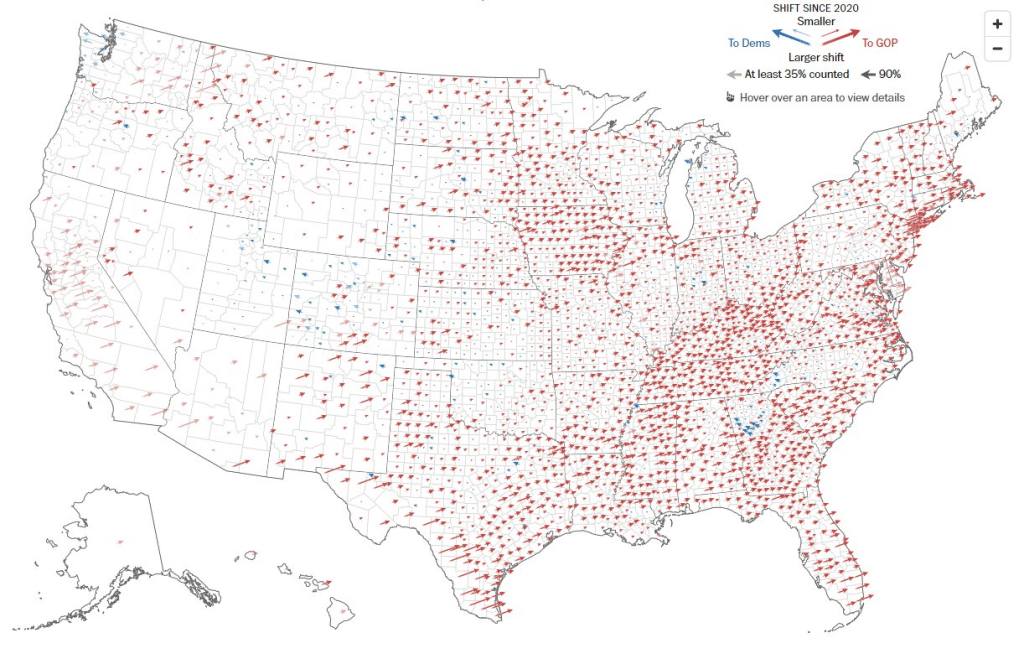
Donald Trump has done it again. Against all odds, he’s reclaimed the presidency, proving that resilience and an unwavering message can still win in America. This victory isn’t just a repeat of 2016—it’s a major blow to the mainstream media narrative that’s painted him as unelectable for years.
Since his last term, he’s faced countless challenges, from relentless federal investigations and high-profile legal battles to heavy media slander and even assassination attempts. Despite all this, Trump has emerged victorious, fueled by his connection with the people and a promise to restore America.
This time, Trump’s win feels even bigger, and here’s why: he didn’t just fight the Democrats, he fought the entire establishment. With Harris underperforming in blue strongholds and Trump surging in both suburbs and rural areas, he secured every battleground state.
But here’s the kicker—he didn’t just win. He scored a victory that may impact future elections for years to come. How? By shifting demographics and widening his appeal, particularly with Hispanic voters. Trump has once again redefined the American political landscape.
From Washington Post:
Former president Donald Trump won the presidency after widespread gains across the country delivered him victory over Vice President Kamala Harris early Wednesday.Most of the nation’s 3,000-plus counties swung rightward compared with 2020. The Republican shift appeared across rural border communities in Texas, the wealthy suburbs of Washington, D.C., and even reliably Democratic counties in New York City.

Red Wave Sweeps Across Blue Strongholds
This election was a statement, a clear shift that left Democrats stunned. In areas that once seemed untouchably blue, Trump managed to secure widespread gains. Take the once-reliable Democratic strongholds across the Rio Grande Valley in Texas, a region historically dominated by left-leaning politics.
On Tuesday night, these counties flipped to red, delivering Trump an unprecedented win in the Valley. In Hidalgo County, for instance, Trump edged out Kamala Harris by three points—a county that Hillary Clinton had once dominated with a 40-point lead back in 2016.
These flips weren’t limited to Texas. Trump saw gains in the suburbs of D.C., wealthy areas that previously leaned Democrat, and even in New York City. Harris just couldn’t keep up. Voters from all walks of life—especially working-class Hispanic communities—swung right.
They’re dealing with sky-high rents and the rising costs of essentials, and they saw in Trump a leader focused on solutions rather than empty promises. It’s as though America collectively took a step back, looked at the struggles they’re facing, and said, “Enough is enough.”
The Hispanic Vote: Turning the Tide
Trump’s victory didn’t happen without a massive shift in Hispanic support. Latino voters, particularly in areas like the Rio Grande Valley, played a crucial role. Frustrated by inflation, crime, and the lack of affordable housing, they turned to Trump, seeing in him someone who understood their struggles.
NBC News reported a notable uptick, with Trump pulling 45% of the Hispanic vote—a record high for a Republican candidate. Vice President Harris, on the other hand, managed to hold only a slim majority of Hispanic voters at 53%, a significant drop from the left-leaning support this demographic has historically shown.
In places like New Jersey, traditionally blue counties shifted rightward, with more Hispanic and working-class voters rejecting the economic status quo under Democratic leadership. Hudson County, New Jersey, once a Democratic fortress, saw a shift as working-class voters, fed up with the rising cost of living, turned to the GOP.
Fox News exit polls revealed that 56% of Trump supporters in New Jersey cited the economy and jobs as their top concerns. Voters are tired of being told that liberal policies help the poor when those same policies make life in places like Hudson County almost impossible for the working class. As New Jersey GOP Chairman Bob Hugin put it, these shifts aren’t flukes. They’re a wake-up call for anyone still doubting the power of Trump’s message.
A Shift in the Political Landscape
Across the country, we’re seeing a political hurricane. Republicans are finally gaining ground in places they’ve historically struggled, while Democrats hold on to their seats by increasingly slim margins.
In New Jersey, even though Democrats managed to hold on to all nine of their House seats, the shift is undeniable. As Republican strategist Chris Russell pointed out, people are tired of being labeled as “racists” or “bigots” just because they don’t align with liberal ideologies. Trump’s victory is more than a win for the GOP—it’s a sign that the everyday American’s voice is being heard again.
New Jersey’s rightward shift mirrors the frustrations of voters nationwide. In fact, this trend first appeared in 2021, with Democrats barely scraping by in elections they should have won easily.
When the red wave hit this time, it was a result of years of growing discontent. The concerns that drove this election—high costs, a struggling economy, and issues of public safety—are real. And for millions of voters, Trump was the only candidate speaking on those issues directly.
A New Era for Republicans in Blue Territory
Trump’s return to the White House didn’t just take back a seat of power; it ushered in a new era of Republican influence in areas once thought unreachable. From rural towns to the suburbs and urban neighborhoods where dissatisfaction with the status quo is growing, Trump’s message resonated.
For years, conservative voters have felt dismissed, misrepresented, and even slandered. This victory feels like a win for all the underdogs who’ve been waiting for someone to stand up for their values.
And the red wave didn’t stop with the presidency. Trump’s re-election brought a new Republican momentum that could redefine the political playing field. The Rio Grande Valley’s stunning flip to red, the Hispanic community’s overwhelming support, and the rightward shift in major suburbs are all signs of a tectonic shift in American politics.
Trump may have won the White House, but more importantly, he’s reshaped the map. And Democrats would be wise to pay attention.
Key Takeaways
- Trump defied all odds to win the presidency, overcoming unprecedented challenges.
- His message resonated with working-class and Hispanic voters frustrated by the economy.
- This red wave could be the start of a long-lasting shift in American politics.
Source: Washington Post, Politico, Breitbart
